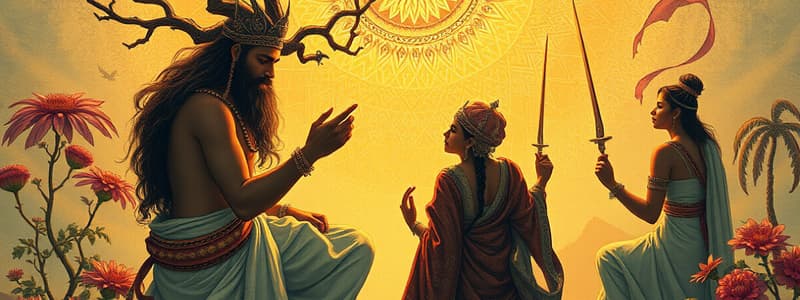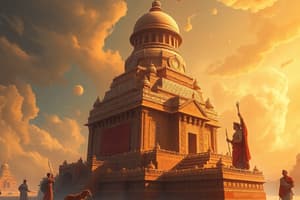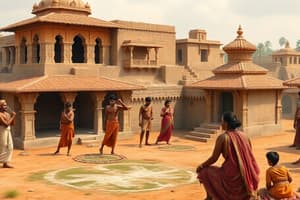Podcast
Questions and Answers
What is the essence of Hinduism based on the belief in?
What is the essence of Hinduism based on the belief in?
- An omnipotent and omnipresent force (correct)
- The worship of ancestors
- Multiple gods with equal power
- A single physical form of God
Which principle of Hindu philosophy relates to moral duty?
Which principle of Hindu philosophy relates to moral duty?
- Dharma (correct)
- Samsara
- Atman
- Karma
How did the Aryans primarily enhance their agricultural prosperity?
How did the Aryans primarily enhance their agricultural prosperity?
- Through the use of iron and improved farming implements (correct)
- By adopting nomadic lifestyles
- By relying solely on natural farming methods
- By migrating to other regions for farming
What term is used to describe the cycle of the soul's immortality and rebirth?
What term is used to describe the cycle of the soul's immortality and rebirth?
What does the term 'Hinduism' signify according to its historical origins?
What does the term 'Hinduism' signify according to its historical origins?
Which of the following is NOT one of the three main principles of Hindu philosophy?
Which of the following is NOT one of the three main principles of Hindu philosophy?
Which king had the kingdom of Hastinapur divided amongst his sons?
Which king had the kingdom of Hastinapur divided amongst his sons?
What aspect of Hinduism is represented in the Upanishads?
What aspect of Hinduism is represented in the Upanishads?
What was the primary purpose of students in the Gurukul system?
What was the primary purpose of students in the Gurukul system?
Who composed the epic Mahabharata?
Who composed the epic Mahabharata?
What is the significance of guru dakshina in the Gurukul system?
What is the significance of guru dakshina in the Gurukul system?
Which Hindu epic contains the Bhagavad Gita?
Which Hindu epic contains the Bhagavad Gita?
What are the main gods that gained importance during the Later Vedic period?
What are the main gods that gained importance during the Later Vedic period?
Which of the following accurately describes Hinduism?
Which of the following accurately describes Hinduism?
What role did women like Maitreyi and Gargi have during the Early Vedic period?
What role did women like Maitreyi and Gargi have during the Early Vedic period?
Which three texts were composed during the Later Vedic period?
Which three texts were composed during the Later Vedic period?
In the context of the Mahabharata, who is Arjuna?
In the context of the Mahabharata, who is Arjuna?
What was indicated by archaeological evidence from the Later Vedic period?
What was indicated by archaeological evidence from the Later Vedic period?
How did the worship practices in Hinduism change during the Later Vedic period?
How did the worship practices in Hinduism change during the Later Vedic period?
Which kingdom was established near present-day Delhi during the Later Vedic period?
Which kingdom was established near present-day Delhi during the Later Vedic period?
Where does the term 'Hindu' derive from?
Where does the term 'Hindu' derive from?
During the Later Vedic period, which ritual was performed to confer supreme power upon a king?
During the Later Vedic period, which ritual was performed to confer supreme power upon a king?
What was the significance of the Ashvamedha yagna in the Later Vedic period?
What was the significance of the Ashvamedha yagna in the Later Vedic period?
What characterized the political organization during the Later Vedic period?
What characterized the political organization during the Later Vedic period?
How did the role of the sabha and samiti change during the Later Vedic period?
How did the role of the sabha and samiti change during the Later Vedic period?
Who did the Pandavas lose everything to in the game of dice?
Who did the Pandavas lose everything to in the game of dice?
What was the condition of the dice game played between the Pandavas and Kauravas?
What was the condition of the dice game played between the Pandavas and Kauravas?
What caused Bharata to refuse the throne of Ayodhya?
What caused Bharata to refuse the throne of Ayodhya?
What was established by Rama that was based on equality and justice?
What was established by Rama that was based on equality and justice?
What event led to the fierce battle in Kurukshetra?
What event led to the fierce battle in Kurukshetra?
What determined a person's caste in the rigid caste system described?
What determined a person's caste in the rigid caste system described?
Which class was responsible for serving the other three classes?
Which class was responsible for serving the other three classes?
During which stage of life does a person primarily focus on education?
During which stage of life does a person primarily focus on education?
What was the attitude towards women in the society described?
What was the attitude towards women in the society described?
What was the primary duty of women according to the described societal norms?
What was the primary duty of women according to the described societal norms?
Which of the following stages involves renouncing worldly ties?
Which of the following stages involves renouncing worldly ties?
At what age did boys typically go to the gurukul?
At what age did boys typically go to the gurukul?
What was the second stage of life known as in the ashrama system?
What was the second stage of life known as in the ashrama system?
What role did the teacher play in a gurukul?
What role did the teacher play in a gurukul?
Which group formed the ruling class in the described society?
Which group formed the ruling class in the described society?
What did the Kauravas trick the Pandavas into losing in the game of dice?
What did the Kauravas trick the Pandavas into losing in the game of dice?
Who was the commander of the army that helped Rama defeat Ravana?
Who was the commander of the army that helped Rama defeat Ravana?
How long were the Pandavas supposed to be in exile after losing the game of dice?
How long were the Pandavas supposed to be in exile after losing the game of dice?
What condition did King Dasaratha have to fulfill that resulted in Rama's exile?
What condition did King Dasaratha have to fulfill that resulted in Rama's exile?
Who became the king of Hastinapur after the defeat of the Kauravas?
Who became the king of Hastinapur after the defeat of the Kauravas?
What did Rama establish that was based on principles of equality and justice?
What did Rama establish that was based on principles of equality and justice?
Which character accompanied Rama during his exile?
Which character accompanied Rama during his exile?
What led to the fierce battle in Kurukshetra?
What led to the fierce battle in Kurukshetra?
What was the relationship between Dasaratha and the three queens?
What was the relationship between Dasaratha and the three queens?
What was the immediate outcome of Rama and Lakshmana's search for food?
What was the immediate outcome of Rama and Lakshmana's search for food?
Flashcards are hidden until you start studying
Study Notes
Origins and Philosophy of Hinduism
- Hinduism evolved from the integration of Indus Valley cultural elements and Aryan beliefs.
- Central to Hinduism is the concept of shakti, an omnipotent and omnipresent energy that serves as the source of creation.
- God, viewed in various forms and names, embodies creation, preservation, and destruction.
- Key principles of Hindu philosophy include:
- Dharma: Moral duty and living a righteous life.
- Karma: The law of cause and effect; individuals face consequences based on their actions.
- Transmigration of the soul: The belief that the soul is eternal, continuously moving into new bodies after death.
Historical Context of Hinduism
- The term "Hinduism" was coined by British colonialists in the early 19th century to encompass diverse ancient religious practices.
- Hinduism has no single founder or defined origin date; it has developed as a way of life across millennia.
- It is often referred to as Sanatan Dharma meaning "Eternal Law."
Economic and Social Life
- The Aryans transitioned to settled life with agriculture as the primary occupation, supported by advancements in iron tools and farming techniques.
- Towns emerged, and trade was conducted primarily through barter systems.
- A rigid caste system emerged, classified into four varnas:
- Brahmanas (priests), Kshatriyas (warriors), Vaishyas (traders and farmers), Shudras (laborers).
The Mahabharata and Ramayana
- Mahabharata: The epic narrates the conflict between Pandavas and Kauravas, culminating in the 18-day battle of Kurukshetra.
- Ramayana: Chronicles Rama's exile due to palace intrigue, his adventures, and eventual return to Ayodhya to establish 'Rama Rajya', a just and prosperous reign.
Family and Social Structure
- The joint family system was prevalent, reinforcing familial bonds.
- Women’s status diminished; they were mainly confined to domestic roles but still participated in religious activities.
- Rigid caste divisions discouraged inter-caste marriages and determined social status by birth.
The Four Ashramas and Education
- Life was divided into four stages, or ashramas:
- Brahmacharya: Student phase spent in a gurukul learning under a teacher.
- Grihastha: Householder stage focused on family life.
- Vanaprastha: Withdrawal from worldly ties for meditation.
- Sanyasa: Renunciation of all worldly attachments and pursuit of asceticism.
- The gurukul education system emphasized discipline and personal service to the guru.
Political Organization and Society
- The Later Vedic period saw small tribal groups evolve into organized kingdoms like Kuru, Kosala, Magadha, and Kashi.
- Hereditary kingship emerged, with various rituals such as Rajasuya and Ashvamedha signifying royal authority.
- Increasing complexities in governance reduced the power of traditional councils (sabha and samiti).
Religion and Rituals
- Transition from Early Vedic deities to a focus on Brahma, Vishnu, and Shiva.
- Worship practices became intricate, requiring Brahman priests for rituals, thereby elevating their societal importance.
- Hinduism is characterized by its adaptability and evolution over centuries, encompassing various beliefs and practices.
Key Terms
- Hereditary: Characteristics passed across generations.
- Rajasuya yagna: Royal ceremony to legitimize a new king.
- Ashvamedha yagna: Horse sacrifice ritual asserting a king’s sovereignty.
- Guru dakshina: Fee paid by students to their teachers post-education.
- Dharma, Karma, and Transmigration of the Soul: Fundamental concepts articulating moral obligations, the impact of actions, and the soul's rebirth, respectively.
Significant Literature
- Important texts include the Atharva Veda, Sama Veda, Yajur Veda, and Upanishads, which became central to Hindu philosophy and practice.
- The two epic texts, Mahabharata and Ramayana, encapsulate the narratives and moral lessons fundamental to Hindu teachings.
Summary of Later Vedic Civilization
- This period (1000 BCE to 500 BCE) marks significant developments in social structure, political organization, and religion, forming the foundation of contemporary Indian culture.
Studying That Suits You
Use AI to generate personalized quizzes and flashcards to suit your learning preferences.




